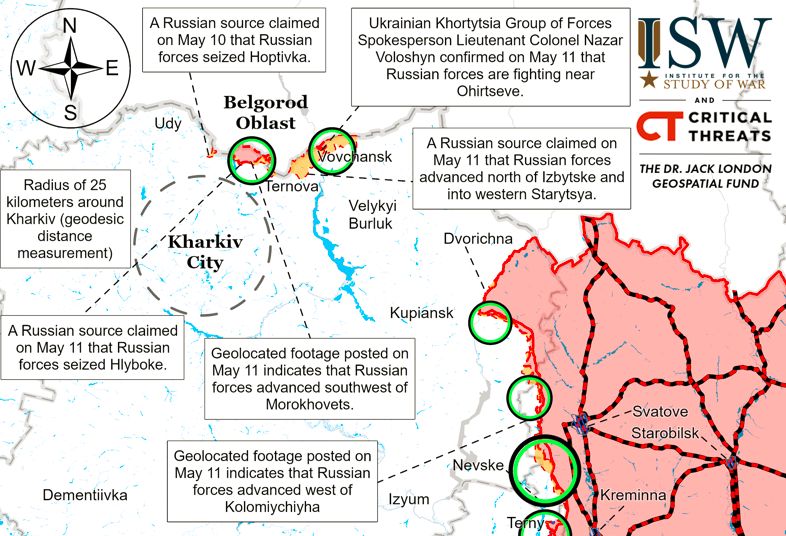ISW: Russia makes limited gainst in Kharkiv Oblast, likely aim to distract Ukrainian forces
The Russian offensive in northern Kharkiv Oblast is not aimed at seizing the city of Kharkiv at this time based on the reported sizes of Russian elements committed to the operations.


The Institute for the Study of War (ISW) reported on 11 May 2024, that Russian forces are conducting “relatively limited offensive operations” along the Russian-Ukrainian border in northern Kharkiv Oblast and have made “tactically significant gains in likely less defended areas.”
However, ISW assessed that the “reported sizes of the Russian elements committed to these limited operations and of the Russian force grouping deployed along the border in northeastern Ukraine indicate that Russian forces are not pursuing a large-scale operation to envelop, encircle, or seize Kharkiv City at this time.”
According to ISW, the Russian offensive operations in northern Kharkiv Oblast “likely aim to draw Ukrainian forces from other sectors of the front while allowing Russian forces to advance to within tube artillery range of Kharkiv City.”
The think tank noted that Russian forces are maintaining the tempo of their offensive operations in other areas, such as the Kupiansk-Svatove-Kreminna line, near Chasiv Yar, and west of Avdiivka.
ISW also pointed out that Russian President Vladimir Putin and the Russian military command “may be evaluating the risks, prospects, and timeline of offensive operations in northern Kharkiv Oblast based on the assumption that Ukraine cannot and will not be able to liberate territory seized by Russian forces.”
The think tank cited the US Office of the Director of National Intelligence’s (ODNI) 2024 Annual Threat Assessment, which reported that Putin “probably believes” that Russian forces have blunted Ukrainian efforts to retake significant territory and that US and Western support for Ukraine is “finite.”
The limited nature of the Russian offensive operations in northern Kharkiv Oblast, according to ISW, suggests that “the resumption of US security assistance has not changed Putin’s calculus or that he launched the Kharkiv effort without reassessing the operation’s fundamental assumptions about Ukrainian capabilities in light of the resumption of aid.”
ISW noted that Russian forces are currently attacking with a force grouping well below its reported intended end strength, which the think tank described as a “risky decision if Putin and the Russian military command believed that there was a threat for Ukrainian forces to roll back any tactical gains that this understrength force could make before Russian forces staffed it to end strength.”
Related:
You could close this page. Or you could join our community and help us produce more materials like this.
We keep our reporting open and accessible to everyone because we believe in the power of free information. This is why our small, cost-effective team depends on the support of readers like you to bring deliver timely news, quality analysis, and on-the-ground reports about Russia's war against Ukraine and Ukraine's struggle to build a democratic society.
A little bit goes a long way: for as little as the cost of one cup of coffee a month, you can help build bridges between Ukraine and the rest of the world, plus become a co-creator and vote for topics we should cover next. Become a patron or see other ways to support.


